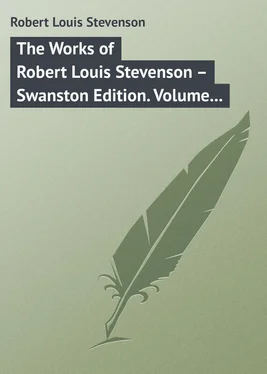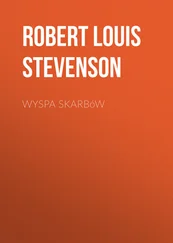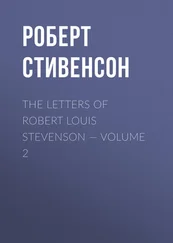Robert Stevenson - The Works of Robert Louis Stevenson – Swanston Edition. Volume 23
Здесь есть возможность читать онлайн «Robert Stevenson - The Works of Robert Louis Stevenson – Swanston Edition. Volume 23» — ознакомительный отрывок электронной книги совершенно бесплатно, а после прочтения отрывка купить полную версию. В некоторых случаях можно слушать аудио, скачать через торрент в формате fb2 и присутствует краткое содержание. ISBN: , Жанр: foreign_prose, на английском языке. Описание произведения, (предисловие) а так же отзывы посетителей доступны на портале библиотеки ЛибКат.
- Название:The Works of Robert Louis Stevenson – Swanston Edition. Volume 23
- Автор:
- Жанр:
- Год:неизвестен
- ISBN:http://www.gutenberg.org/ebooks/30894
- Рейтинг книги:3 / 5. Голосов: 1
-
Избранное:Добавить в избранное
- Отзывы:
-
Ваша оценка:
- 60
- 1
- 2
- 3
- 4
- 5
The Works of Robert Louis Stevenson – Swanston Edition. Volume 23: краткое содержание, описание и аннотация
Предлагаем к чтению аннотацию, описание, краткое содержание или предисловие (зависит от того, что написал сам автор книги «The Works of Robert Louis Stevenson – Swanston Edition. Volume 23»). Если вы не нашли необходимую информацию о книге — напишите в комментариях, мы постараемся отыскать её.
The Works of Robert Louis Stevenson – Swanston Edition. Volume 23 — читать онлайн ознакомительный отрывок
Ниже представлен текст книги, разбитый по страницам. Система сохранения места последней прочитанной страницы, позволяет с удобством читать онлайн бесплатно книгу «The Works of Robert Louis Stevenson – Swanston Edition. Volume 23», без необходимости каждый раз заново искать на чём Вы остановились. Поставьте закладку, и сможете в любой момент перейти на страницу, на которой закончили чтение.
Интервал:
Закладка:
To some readers, perhaps – (from this point I again resume my Introduction of 1899, but with more correction and abridgment) – to some, perhaps, the very lack of art as a correspondent to which Stevenson, as above quoted, pleads guilty may give the reading an added charm and flavour. What he could do as an artist in letters we know. I remember Sir John Millais, a shrewd and very independent judge of books, calling across to me at a dinner-table, “You know Stevenson, don’t you?” and then going on, “Well, I wish you would tell him from me, if he cares to know, that to my mind he is the very first of living artists. I don’t mean writers merely, but painters and all of us. Nobody living can see with such an eye as that fellow, and nobody is such a master of his tools.” But in his letters, excepting a few written in youth and having more or less the character of exercises, and a few in after years which were intended for the public eye, Stevenson the deliberate artist is scarcely forthcoming at all. He does not care a fig for order or logical sequence or congruity, or for striking a key of expression and keeping it, but becomes simply the most spontaneous and unstudied of human beings. He has at his command the whole vocabularies of the English and Scottish languages, classical and slang, with good stores of the French, and tosses and tumbles them about irresponsibly to convey the impression or affection, the mood or freak of the moment; pouring himself out in all manner of rhapsodical confessions and speculations, grave or gay, notes of observation and criticism, snatches of remembrance and autobiography, moralisings on matters uppermost for the hour in his mind, comments on his own work or other people’s, or mere idle fun and foolery.
By this medley of moods and manners, Stevenson’s letters at their best come nearer than anything else to the full-blooded charm and variety of his conversation. Nearer, yet not quite near; for it was in company only that his genial spirit rose to his very best. Few men probably have had in them such a richness and variety of human nature; and few can ever have been better gifted than he was to express the play of being that was in him by means of the apt, expressive word and the animated look and gesture. Divers et ondoyant , in the words of Montaigne, beyond other men, he seemed to contain within himself a whole troop of singularly assorted characters. Though prose was his chosen medium of expression, he was by temperament a born poet, to whom the world was full of enchantment and of latent romance, only waiting to take shape and substance in the forms of art. It was his birthright —
“to hear
The great bell beating far and near —
The odd, unknown, enchanted gong
That on the road hales men along,
That from the mountain calls afar,
That lures the vessel from a star,
And with a still, aerial sound
Makes all the earth enchanted ground.”
He had not only the poet’s mind but the poet’s senses: in youth ginger was only too hot in his mouth, and the chimes at midnight only too favourite a music. At the same time he was not less a born preacher and moralist and son of the Covenanters after his fashion. He had about him, as has been said, little spirit of social or other conformity; but an active and searching private conscience kept him for ever calling in question both the grounds of his own conduct and the validity of the accepted codes and compromises of society. He must try to work out a scheme of morality suitable to his own case and temperament, which found the prohibitory law of Moses chill and uninspiring, but in the Sermon on the Mount a strong incentive to all those impulses of pity and charity to which his heart was prone. In early days his sense of social injustice and the inequalities of human opportunity made him inwardly much of a rebel, who would have embraced and acted on theories of socialism or communism, could he have found any that did not seem to him at variance with ineradicable instincts of human nature. All his life the artist and the moralist in him alike were in rebellion against the bourgeois spirit, – against timid, negative, and shuffling substitutes for active and courageous well-doing, – and declined to worship at the shrine of what he called the bestial goddesses Comfort and Respectability. The moralist in him helped the artist by backing with the force of a highly sensitive conscience his instinctive love of perfection in his work. The artist qualified the moralist by discountenancing any preference for the harsh, the sour, or the self-mortifying forms of virtue, and encouraging the love for all tender or heroic, glowing, generous, and cheerful forms.
Above all things, perhaps, Stevenson was by instinct an adventurer and practical experimentalist in life. Many poets are content to dream, and many, perhaps most, moralists to preach: Stevenson must ever be doing and undergoing. He was no sentimentalist, to pay himself with fine feelings whether for mean action or slack inaction. He had an insatiable zest for all experiences, not the pleasurable only, but including the more harsh and biting – those that bring home to a man the pinch and sting of existence as it is realised by the disinherited of the world, and excluding only what he thought the prim, the conventional, the dead-alive, and the cut-and-dry. On occasion the experimentalist and man of adventure in him would enter into special partnership with the moralist and man of conscience: he was prone to plunge into difficult social passes and ethical dilemmas, which he might sometimes more wisely have avoided, for the sake of trying to behave in them to the utmost according to his own personal sense of the obligations of honour, duty, and kindness. In yet another part of his being he cherished, as his great countryman Scott had done before him, an intense underlying longing for the life of action, danger and command. “Action, Colvin, action,” I remember his crying eagerly to me with his hand on my arm as we lay basking for his health’s sake in a boat off the scented shores of the Cap Martin. Another time – this was on his way to a winter cure at Davos – some friend had given him General Hamley’s Operations of War : – “in which,” he writes to his father, “I am drowned a thousand fathoms deep, and O that I had been a soldier is still my cry.” Fortunately, with all these ardent and divers instincts, there were present two invaluable gifts besides: that of humour, which for all his stress of being and vivid consciousness of self saved him from ever seeing himself for long together out of a just proportion, and kept wholesome laughter always ready at his lips; and that of a most tender and loyal heart, which through all his experiments and agitations made the law of kindness the one ruling law of his life. In the end, lack of health determined his career, giving the chief part in his life to the artist and man of imagination, and keeping the man of action a prisoner in the sickroom until, by a singular turn of destiny, he was able to wring a real prolonged and romantically successful adventure out of that voyage to the Pacific which had been, in its origin, the last despairing resource of the invalid.
Again, it was characteristic of this multiple personality that he never seemed to be cramped like the rest of us, at any given time of life, within the limits of his proper age, but to be child, boy, young man, and old man all at once. There was never a time in his life when Stevenson had to say with St. Augustine, “Behold! my childhood is dead, but I am alive.” The child lived on always in him, not in memory only, but in real survival, with all its freshness of perception unimpaired, and none of its play instincts in the least degree extinguished or made ashamed. As for the perennial boy in Stevenson, that is too apparent to need remark. It was as a boy for boys that he wrote the best known of his books, Treasure Island , and with all boys that he met, provided they were really boys and not prigs nor puppies, he was instantly and delightedly at home. At the same time, even when I first knew him, he showed already surprising occasional traits and glimpses of old sagacity, of premature life-wisdom and experience.
Читать дальшеИнтервал:
Закладка:
Похожие книги на «The Works of Robert Louis Stevenson – Swanston Edition. Volume 23»
Представляем Вашему вниманию похожие книги на «The Works of Robert Louis Stevenson – Swanston Edition. Volume 23» списком для выбора. Мы отобрали схожую по названию и смыслу литературу в надежде предоставить читателям больше вариантов отыскать новые, интересные, ещё непрочитанные произведения.
Обсуждение, отзывы о книге «The Works of Robert Louis Stevenson – Swanston Edition. Volume 23» и просто собственные мнения читателей. Оставьте ваши комментарии, напишите, что Вы думаете о произведении, его смысле или главных героях. Укажите что конкретно понравилось, а что нет, и почему Вы так считаете.










